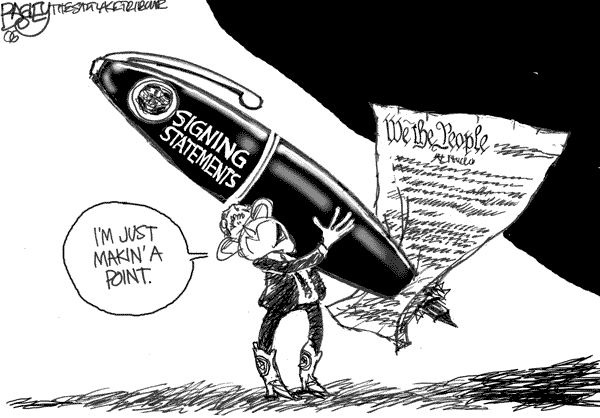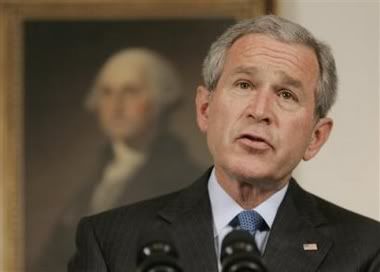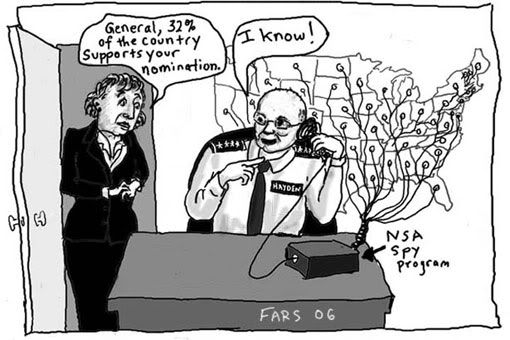(Note: Updated below with more info on Rove's '06 strategy)
As the midterms approach, the Republicans will try a number of strategies to turn voters against the Democrats. I'm sure the old weak-on-terror card will be played heavily, but another narrative is taking shape too... the idea that if Democrats win, they will only use their power to launch investigations into President Bush and impeach him. We saw this narrative take shape during Feingold's censure movement and in Sen. Elizabeth Dole's
email. This is a false narrative, as the Democratic party leadership as a whole has expressed little interest in censure or impeachment of the President. Some basic oversight, yes, but not impeachment. Calls for that action from the party base have been ignored or dismissed. The Democratic leaders have always been clear that, obviously, their agenda upon coming into a majority position will be policy-based.
Despite this, the Republicans insist on warning about impeachment. Perhaps the Republicans feel bad that they spent the entire Clinton administration going on a partisan witch-hunt of the President, trying to turn even the flimsiest of scandals (Whitewater, Travelgate) into the next Watergate, that they simply don't want the Democrats to behave equally overzealous. They're quite thoughtful like that.
Now this talking point is getting bigger.
Drudge had as his lead headline yesterday this- "DEMS PLOT HOUSE TAKEOVER; PROBES OF BUSH..." Yes, because in the world of hardcore Republican loyalists, Democrats
running for election through the democratic process and organizing campaigns amounts to a major 'plot'. I've even seen these Democrats discuss it on television- my god, they're not even hiding their coup! As for probes of Bush being something shocking, apparently people don't remember, ya know, history. We had probes of Clinton (and how!), probes of Reagan, etc; it's quite common for Congress to exert its oversight authority to investigate the actions of the Executive branch. It is only because the current Congress has so completely abdicated their duties in this regard that the idea of it seems so radical.
Tim Russert also pushed this narrative in his interview yesterday with Rep. Pelosi, who did her best to brush off the notion. "Is it going to be payback time?", Russert asked Pelosi. That is a popular warping of this debate- the notion that any probes of Bush would be about 'revenge'. By framing the debate this way, White House advocates deflect any legitimacy hearings would have by painting the Democrats as having merely a partisan or emotional reason for them. The fact that such hearings might actually be justified is not a consideration for these advocates. Russert went even further to defend Bush, insisting to Pelosi that Democrats have done equally bad things and could be investigated too. He brought up Reps. Kennedy and McKinney, because apparently, in Russert world, a car accident and striking a capitol cop are the equivalent of what President Bush has done (disastrous preemptive wars based on faulty intel, record debt, torture, warrantless wiretapping, failure to respond to drowning of a major American city, campaign to out a CIA agent, etc). I don't want to defend the Kennedy/McKinney incidents (though they were both two isolated
apolitical incidents from relatively unknown House members), but if those are the worst Democratic scandals of the past few years, I would say that's good news for them. It's not surprising that Russert would defend the White House's honor, they've been very good to him.
Russert also namechecked Rep. Conyers (who is leading an impeachment movement in the House), painting him as a boogeyman the right can use in their campaign. He noted that Conyers would be the Chairman of the Judiciary Committee and asked Pelosi if Conyers "should take down his website" which calls for a bipartisan committee to investigate pre-war intel and other matters. Yikes, Tim, how about you ask Pelosi if the party should disband all together?
Rep. Conyers
has responded to Russert, stating in a blog post that "Perhaps Mr. Russert has forgotten, but I have been a Chairman before. For five years, from 1989 to 1994, I was the Chairman of the House Government Operations Committee, now called the Government Reform Committee. I have a record of trying to expose government waste, fraud and abuse. That was back when Congress did something called 'oversight.' You know, in our tri-partite system of government, when Congress actually acted like a co-equal branch." Conyers 1, Russert 0.
Russert's fellow NBC traveler Chris Matthews has been
on this for a while, stating on April 5th about Democrats that "They've got a bunch of crazy guys who are going to try to lynch the president." This, again, like Russert's 'revenge' talking point is meant to delegitamize any real need for investigation by painting the Democrats as "crazy" people who simply want to "lynch" the poor, embattled President.
I have yet to come across a pundit discussing the issue on its merits rather than an emotional appeal.
The next issue is whether or not this narrative will work- ie. will it 'rally' the Republican base and/or turn off swing voters? I'm going to say 'no'. The swing voters are a lost cause for the Republicans this year. As for the base? Well, most likely many of them will just be sitting out this election and I think it will take a lot more than the phantom threat of Bush impeachment to get them to the polls. Remember, this isn't 2004, most voters don't see Bush as the Hero War President whom we depend upon for our very survival anymore. Now he's just the lameduck who most people would prefer to ignore. Bob Cesca also explores this question is his
analysis of Pelosi's 'Meet The Press' appearance (spoiler: she could've done better), stating that "ultimately it doesn't affect how Americans vote. Look no further than the Republican returns of 2000, 2002, and 2004 following years of a GOP-led investigation and impeachment against President Clinton". Agreed. In the end, I think this ends up being merely an inside-the-beltway fear. I doubt the average American cares either way.
To their credit, the Democrats are
trying to deflect this narrative, insisting that when they take over Congress, they will actually have other priorities and that hearings would be based on that pesky 'oversight' Conyers spoke of, and not some witchhunt. For instance, Pelosi said to Russert yesterday that "I said we'd be having hearings on the war, we'd have hearings. But I don't see us going to a place of impeachment. Investigation does not equate to impeachment. Investigation is the requirement of Congress. It is about checks and balances." Checks and whatnow?
Finally- and most importantly- all of this debate assumes to begin with that Democrats will even try to impeach President Bush at all. As I noted in the beginning, it's a big assumption to make. I am not convinced they will. Ohh sure, some like Conyers do want to, but they have been marginalized within the party (Pelosi dismissed him on 'Meet the Press' as an "enthusiastic advocate"). When Conyers wanted to hold hearings on the very important Downing Street memo, he was relocated to the basement for the hearing and was even cut short in addition to add to the embarassment. When Sen. Feingold introduced his censure resolution, all but three other Democrats even wanted to comment on the issue. They were literally running away from it. When Specter did let him have a hearing (scheduled on a Friday, natch), no Democrat except for Sen. Leahy even bothered to attend. Many attempts at oversight like this by principled Democrats have not exactly been well-received by their party at large.
Given this, how can Republicans and pundits honestly believe there is an impeachment conspiracy?
Personally, I do fully support the impeachment movement. I am also, however, realistic that it must be approached with caution and that they must convince the public about it before it begins. Democrats have many priorities if/when they gain control of Congress. Resetting the legislative agenda (looking at energy needs, health care, tax cuts, etc) is the first priority. Voters won't tolerate otherwise. But, yes, they should also make up for the lack of oversight in the past few years. At this point, I would say that
Carl Bernstein's proposal for a bipartisan investigative committee (ala the Watergate hearings) is the best route to go. This would be fact-finding mission rather than a political one. As Bernstein noted, "The system has thus far failed during the presidency of George W. Bush—at incalculable cost in human lives, to the American political system, to undertaking an intelligent and effective war against terror, and to the standing of the United States in parts of the world where it previously had been held in the highest regard." And, as with Watergate, there are many overlapping issues for such a Committee to explore. In the end, what the hearings would probably find (given what we know/assume already) would likely give them enough evidence to convince the public of the need for impeachment anyway. If the President has nothing to hide, the Democrats should note, then he won't mind cooperating with hearings (spoiler: he will mind). As with the 9/11 Commission, and other investigations, President Bush will surely fight any inquiry like it's life or death.
I say let the Republicans spin this narrative or any narrative they want. If this is all they have left, the Democrats should proudly note, then they are in dire straits indeed. The Republicans have failed on practically every level. If all they have left to rally their base are political boogeymen (impeachment, gay marriage, etc) rather than actual legislative/political successes, then they are definitely not deserving of reelection. Now let's see if the Democrats are smart enough to make
that the prevailing narrative.
[PS- The idea of scaring Republicans with the 'threat' of Democratic control of Congress appears to be Karl Rove's top strategy to help Republicans win reelection. He is going around and
asking Republicans to rally behind President Bush for only in a unified front can they win. Sounds like Bush's brain is running on fumes if he believes that Republicans will want to be associated with Bush right now (poor Karl may be distracted by that special prosecutor
looking over his shoulder). Andrew Sullivan has a
great analysis of this strategy, noting that "Rove's strategy will be to emphasize the horror of Speaker Pelosi as a reason for Republicans to show up in November. We'll get the usual gay-baiting, nicely timed to be rolled out in the Senate on 6/6/6.". He lists five subjects they will likely use- Mexicans, gays, religion, terrorist-loving Dems, and the evil of Hillary Clinton- to rally the base. Sullivan doesn't believe conservatives will be easily swayed this year. Let's hope he's right.]





